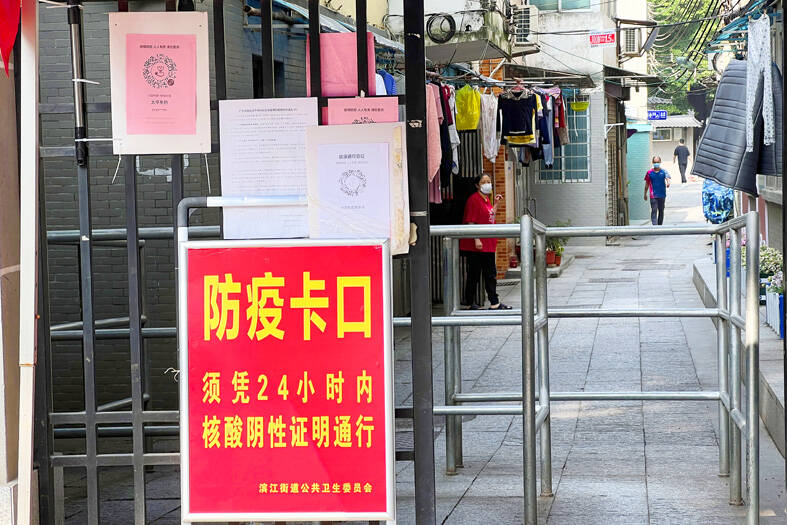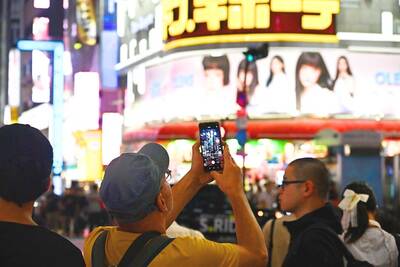China’s tough COVID-19 lockdowns are fueling an increase in public anger, with some residents in Guangzhou, one of the country’s biggest cities, staging rare protests against the stringent rules.
In videos circulating on social media, hundreds of protesters were seen marching in the street and pushing over police barriers in Haizhu district, which has been in lockdown since late last month.
The demonstrations took place in several “urban villages,” mainly poorer neighborhoods where migrant workers live, the Hong Kong Economic Journal reported.

Photo: AP
The local government sent multiple police vehicles to the protests, the paper said.
Chinese residents are becoming increasingly upset after almost three years of draconian social restrictions under the country’s “zero COVID-19” policy.
Lockdowns are showing no sign of abating even as authorities ease some curbs, such as shortening the mandatory quarantine period for inbound travelers and scrapping a system where airlines are penalized for carrying infected passengers.
Food shortages and difficulty getting timely medical treatment are some of the biggest complaints lodged by those shut into their homes.
Few posts discussing the protests — deemed riots by some — could be found on Sina Weibo and WeChat, two of the largest social media platforms in China, where online discussions are censored to control public opinion.
As of yesterday morning, hashtags on Weibo such as “Guangzhou Haizhu district riot” and “Haizhu riot” remained visible, but posts which could previously be seen were gone.
Guangzhou has locked down two other districts, including Panyu and Liwan, as daily infections surged to 5,124 on Monday.
Huang Kunming (黃坤明), the Chinese Communist Party chief of Guangdong, the province that includes Guangzhou, ordered officials to eliminate the virus in communities “as soon as possible,” the paper reported, citing an internal meeting on Monday evening.

BRUSHED OFF: An ambassador to Australia previously said that Beijing does not see a reason to apologize for its naval exercises and military maneuvers in international areas China set off alarm bells in New Zealand when it dispatched powerful warships on unprecedented missions in the South Pacific without explanation, military documents showed. Beijing has spent years expanding its reach in the southern Pacific Ocean, courting island nations with new hospitals, freshly paved roads and generous offers of climate aid. However, these diplomatic efforts have increasingly been accompanied by more overt displays of military power. Three Chinese warships sailed the Tasman Sea between Australia and New Zealand in February, the first time such a task group had been sighted in those waters. “We have never seen vessels with this capability

A Japanese city would urge all smartphone users to limit screen time to two hours a day outside work or school under a proposed ordinance that includes no penalties. The limit — which would be recommended for all residents in Toyoake City — would not be binding and there would be no penalties incurred for higher usage, the draft ordinance showed. The proposal aims “to prevent excessive use of devices causing physical and mental health issues... including sleep problems,” Mayor Masafumi Koki said yesterday. The draft urges elementary-school students to avoid smartphones after 9pm, and junior-high students and older are advised not

Philippine President Ferdinand Marcos Jr has fired his national police chief, who gained attention for leading the separate arrests of former Philippine president Rodrigo Duterte on orders of the International Criminal Court and televangelist Apollo Carreon Quiboloy, who is on the FBI’s most-wanted list for alleged child sex trafficking. Philippine Executive Secretary Lucas Bersamin did not cite a reason for the removal of General Nicolas Torre as head of the 232,000-member national police force, a position he was appointed to by Marcos in May and which he would have held until 2027. He was replaced by another senior police general, Jose

POWER CONFLICT: The US president threatened to deploy National Guards in Baltimore. US media reports said he is also planning to station troops in Chicago US President Donald Trump on Sunday threatened to deploy National Guard troops to yet another Democratic stronghold, the Maryland city of Baltimore, as he seeks to expand his crackdown on crime and immigration. The Republican’s latest online rant about an “out of control, crime-ridden” city comes as Democratic state leaders — including Maryland Governor Wes Moore — line up to berate Trump on a high-profile political stage. Trump this month deployed the National Guard to the streets of Washington, in a widely criticized show of force the president said amounts to a federal takeover of US capital policing. The Guard began carrying